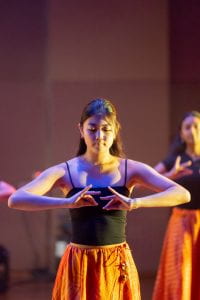I am particularly interested in the way Sophocles problematises Antigone as a Tragic Hero due to her glorification over her death to come. Antigone rejecting Ismene’s willingness to die with her arises as a problem due to her motive for doing so. Rather than do it for the sake of protecting Ismene, she rejects her help because she wants to relish in the glory of having defended her family. Because Antigone buried the dead body on her own, she believes that she should take all the credit for doing so. More than that though, perhaps it is because of her filial piety. She had a duty to honour and respect her family. In that sense, she was the only one who fulfilled that duty… (Hannah)
Henah more directly outlines the character of Antigone and her relationship toward other people:
I find it interesting how Sophocles problematizes Antigone through her deeply human, flawed behaviour intertwined with her respect of the divine law. The way that she treats her sister, Ismene, is generally cold and bitter, arguably too judgemental. Antigone’s words are often even cruel, and this seems at odds with the familial duty that she is willing to perform for Polynices, who killed her other brother, Eteocles. She is not without hubris, and it is questionable whether her motive for burying Polynices is to be solely true to the will of gods, or for her own glory—as Creon himself accused her of. Because of these traits she becomes a complex character who is at once fulfilling the divine law and her duty, but also competing for the role of the tragic hero against Creon. (Henah)
Aaron brings in idea of competing for the role of the tragic hero and perhaps where our sympathies should lie:
Sophocles problematises Antigone as a character she is competing with Creon for the role of a tragic hero, both have their hubris and flaws as heroes. Antigone’s cold-hearted nature creates a complex character making it hard to sympathise with her, yet due to the nature of the play and the ideals of Sophocles who was conservative at the time, we should be siding with Antigone as she is trying to fulfil her religious role. (Aaron)
Thiya written idea more clearly:
Sophocles presents her as a problematic hero as he seems to misalign the audience’s sympathies with her on multiple occasions. On one hand, it seems that she is doing something honorable for her brother by burying him, however, her motives are highlighted in the exchange between herself and Ismene. Here she seems to hold a selfish appeal in obeying the gods when she rejects Ismene’s newly changed stance. Rather than the reason for the rejection of Isnemes death as a sisterly love, Sophocles portrays it as something far more selfish. This can cause the audience to question whether Antigone’s religious stance is due to her morals or he glory and treatment after death (Thiya)
Lila talking about the downfall:
The character convention of the tragic hero relies most heavily (in my mind) on two tropes – the character must begin at the top, in utter glory, and their fall must be due solely to themselves (often by hubris). So Antigone doesn’t exactly fit his description. As she says, she has lived a life of only misery and suffering – she ‘welcomes’ death – we have never seen her in a position of glory and happiness (I suppose her status as a princess and her love for Haemon might redeem her here though – not perfect but closer to it than she is by the end of the play). Secondly, her fall (death) is at the hands of Creon, not herself. She arguably does the right thing, and although her hamartia is probably hubris and stubbornness, it is only evident because she is so possessed to do right by her brother. Finally, she does not hold our sympathies, and thinking back to the intended audience, it is even more unlikely for her to be the tragic hero. Why would an ampitheatre full of men wish to see a woman’s fall, especially considering the lack of power that women had in that time…(Lila)
Antigone character: inconsistencies with her character. multifaceted.



